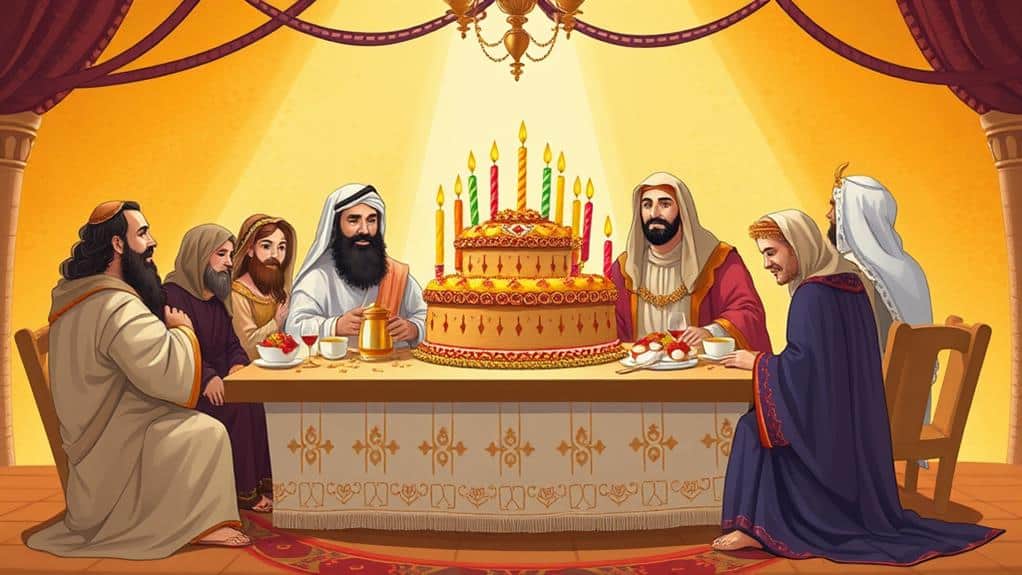Noah's story isn't just about building a really big boat—though it did need a lot of wood and a skilled carpenter!
It beautifully illustrates God's commitment to salvation and redemption. While the world around him was falling into chaos, Noah stood out with his unwavering faith and moral integrity, earning him the title of God's chosen servant.
The Ark, a floating symbol of hope, showcases God's meticulous plan for preserving life.
After the flood, the covenant made with Noah highlights the crucial role of faith and obedience in our relationship with God.
By diving into Noah's narrative, we gain valuable insights into righteousness, faith, and obedience—essential themes for anyone seeking to understand God's redemptive plan.
Key Takeaways
- Noah's righteous living and faithfulness to God amidst widespread corruption set him apart as God's chosen.
- God chose Noah to build the Ark, symbolizing salvation, and establish a new covenant, ensuring humanity's future.
- Noah's story highlights the importance of faith and obedience, demonstrating spiritual resilience in adversity.
- Through Noah's legacy, modern believers are inspired to cultivate deep faith, commit to righteousness, and promote moral integrity.
- Noah's selection by God demonstrates the transformative power of divine intervention and the potential for divine favor in response to human faithfulness.
Noah's Righteousness in a Corrupt World
In a world where moral decay had reached catastrophic proportions, one individual stood out as a beacon of righteousness: Noah. Amidst the corruption, Noah's moral integrity shone brightly, demonstrating the value of living a righteous life despite surrounding chaos.
His unwavering faith in God drew ridicule from others, but he remained steadfast, obeying divine commands to build the Ark. This proof of faith under ridicule became a symbol of hope in darkness, demonstrating that righteousness amid chaos can lead to divine favor.
Noah's story emphasizes the importance of enduring faith, obedience to commands, and trust in divine guidance, showcasing the transforming power of righteousness in the face of societal corruption, ultimately revealing the depths of divine intervention in human affairs.
Understanding Divine Selection and Grace
Noah's exemplary righteousness in a corrupt world did not escape God's notice, and his faithfulness became the catalyst for divine favor. This favor was not solely based on his good deeds, but also on his unwavering commitment to God's instructions, showcasing his moral integrity.
In a world consumed by sin, Noah's steadfast faith and obedience set him apart, earning him a unique position in God's eyes. The biblical account highlights the significance of faith and righteousness in attracting divine favor, underscoring the importance of moral integrity in a corrupt world.
As a result, Noah's story serves as a powerful reminder of the value of steadfast faith and obedience in the face of overwhelming wickedness, demonstrating the transformative power of divine favor in the lives of the faithful.
The Ark as a Symbol of Salvation
Two prominent aspects of the Ark narrative underscore its symbolic significance: its role as a physical manifestation of divine salvation and its meticulous construction according to God's instructions.
The ark's dimensions, measuring 300 cubits in length, 50 cubits in width, and 30 cubits in height (Genesis 6:15), demonstrate God's attention to detail in designing a vessel for salvation.
The Ark's purpose was not only to preserve Noah's family but also to safeguard a representation of the animal kingdom, highlighting God's concern for the entirety of His creation.
Through the Ark's construction and the subsequent animal preservation, God's mercy and judgment are juxtaposed, underscoring the gravity of sin and the importance of obedience to divine instruction.
The Ark serves as a poignant reminder of God's salvation plan.
The Covenant and Promise of Renewal
Following the devastating flood, a pivotal moment in biblical history, God establishes a covenant with Noah, underscoring His unwavering commitment to humanity's future.
The covenant significance lies in God's promise never to flood the Earth again, as recorded in Genesis 9:11. This promise symbolizes hope and renewal after destruction, highlighting God's faithfulness and commitment to humanity.
The rainbow serves as a visual reminder of this covenant, representing renewal symbolism and the unfolding of a grand salvation plan. Through this covenant, God reaffirms His relationship with humanity, emphasizing the importance of faith and obedience.
The covenant with Noah underscores the depth of God's love and commitment to humanity, providing a foundation for understanding the redemptive narrative that unfolds throughout Scripture.
Lessons From the Flood Narrative
Emerging from the waters of destruction, the flood narrative presents a profound opportunity for reflection on the nature of divine judgment and the human condition. The story of Noah offers valuable lessons on the importance of faith, obedience, and righteousness.
Societal reflections reveal a world plagued by corruption and violence, while Noah's example demonstrates the possibility of divine favor and redemption.
Key Takeaways from the Flood Narrative:
- Divine Judgment and Human Accountability: The flood narrative highlights God's response to sin and humanity's accountability for their actions.
- Faith and Obedience: Noah's story showcases the importance of trust and obedience in divine guidance.
- Societal Reflections: The flood narrative serves as a commentary on the consequences of societal wickedness and corruption.
- Flood Implications: The event emphasizes the significance of divine judgment and the importance of living a righteous life.
The Importance of Faith and Obedience
A cornerstone of the biblical narrative, the story of Noah underscores the essential significance of faith and obedience in the life of a believer.
Noah's unwavering faith amidst ridicule and his meticulous obedience to God's instructions serve as a beacon of hope for modern believers facing faith challenges.
His experience demonstrates that steadfast faith can lead to divine favor, as he found grace in God's eyes and became the heir of righteousness.
The rewards of obedience are evident in Noah's story, as his family was preserved, and a new covenant was established.
This narrative invites reflection on the importance of trust in divine guidance and encourages believers to remain steadfast in their faith, demonstrating that obedience to God's commands can yield profound rewards.
Noah's Legacy for Modern Believers
Noah's remarkable story offers timeless lessons for modern believers, underscoring the significance of faith and obedience in steering through life's challenges.
His legacy continues to inspire and motivate individuals to live a life of righteous living, moral integrity, and enduring faith. The impact of Noah's influence extends beyond his immediate community, demonstrating the potential for community impact and spiritual resilience in the face of adversity.
Key Takeaways from Noah's Legacy:
- Emulate Enduring Faith: Noah's unwavering trust in God's promises serves as a model for modern believers to cultivate a deep and abiding faith.
- Prioritize Righteous Living: Noah's commitment to living a virtuous life, even in a corrupt world, highlights the importance of moral integrity.
- Seek Community Impact: Noah's actions demonstrate the potential for individuals to positively influence their communities through their faith and obedience.
- Cultivate Spiritual Resilience: Noah's perseverance in the face of adversity serves as an inspiration for modern believers to develop spiritual resilience in their own lives.
Frequently Asked Questions
How Did Noah's Contemporaries React to His Ark-Building Endeavors?
Noah's contemporaries responded with contemporary disbelief and societal mockery to his ark-building endeavors, ridiculing his obedience to God's instructions, highlighting the stark contrast between Noah's faith and the wickedness of his generation (Hebrews 11:7, Genesis 5:32-6:4).
What Was the Approximate Age of Noah When the Flood Occurred?
Noah's age at the time of the flood is calculated to be approximately 600 years, based on the biblical account of his life and the flood timeline outlined in Genesis 5:32 and 7:6, 11.
How Did Noah Manage to Collect All the Animals for the Ark?
Noah's animal gathering and ark logistics were facilitated by God's guidance, as the animals instinctively migrated to the ark, while Noah, acting in obedience, prepared the vessel according to divine specifications (Genesis 6:20, 7:2-5).
Were Other Humans Aware of the Impending Flood Besides Noah's Family?
Scriptural accounts suggest that public awareness of the impending flood was limited to Noah's family, with prophetic warnings largely falling on deaf ears, underscoring the significance of divine revelation and obedience in the face of impending judgment.
What Happened to the Bodies of Those Who Died in the Flood?
Following the flood, the bodies of the deceased likely decomposed or were buried under layers of sediment. Ancient burial practices were not applicable in this catastrophic event, as the flood's aftermath rendered traditional rituals impossible.
Conclusion
The narrative of Noah offers profound insights into the nature of divine selection, the importance of steadfast faith, and the promise of renewal. Through Noah's righteousness in a corrupt world, the biblical account underscores the significance of obedience and faithfulness in the face of adversity. The story of Noah serves as a paradigm for understanding the dynamics of divine grace, salvation, and the covenant relationship between God and humanity, remaining a rich fabric of themes and lessons for contemporary discussions of faith and righteousness.






